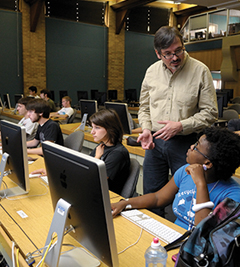Lincoln Hall Project
Coming of Age
Evolving Methods and Technology
The University’s New Gateway
It’s hard to believe that just 20 years ago programmers at the U of I’s National Center for Supercomputing Applications (NCSA) developed Mosaic 1.0, the world’s first graphical browser credited with making the World Wide Web a household word. Soon after, the U of I came online in 1994 when programmer Kate “Ducky” Sherwood was told only to “go do great things.” She designed the first central campus webpages, and the trend grew. Today the Web is considered a gateway to the U of I, with virtually every college, department, and unit maintaining a page.

Keeping Abreast of Change
The U of I has long been on the cutting edge of technology and how to implement it. In 1985, the U of I was one of the first universities to install a supercomputer, capable of performing tasks within hours that would have taken a year on weaker computers. Researchers across campus still rely heavily upon supercomputers. And as email and Internet usage have become ubiquitous, the U of I has moved to online education. For example, some 80 courses are available through the LAS OnLine program, and in 2012 the U of I partnered with Coursera to offer free online courses worldwide.

Groundbreaking Research and Scholarship
Scholars and researchers in the College of LAS have broken new ground in technology, our understanding of life, and our way of thinking. They include many researchers in the sciences, such as chemistry professor Ryan Bailey, who has found new applications for nanotechnology. Scholars have written influential books, such as Richard Powers’s The Echo Maker, and added insight to national debates, such as philosophy professor David Sussman, whose thoughts on the immorality of torture came to light during the Iraq war. Eight scientists in atmospheric sciences shared part in a 2007 Nobel Prize for their work on climate change, and May Berenbaum became known not only for her research on insects but the effective ways she communicates that research with the public.
New Approaches to Education and Programs
Changes in technology and infrastructure have been accompanied by changes in education and programs. In 1996, after nearly 80 years of a five-point grading scale, the U of I switched to a four-point scale. In addition to new online courses, many on-campus courses now have online elements. Studying abroad has grown, as have new programs intended to ease the transition for incoming freshmen. Administrators have placed growing emphasis on career development opportunities. And interactive teaching techniques are being developed particularly in large classrooms to provide more hands-on education.